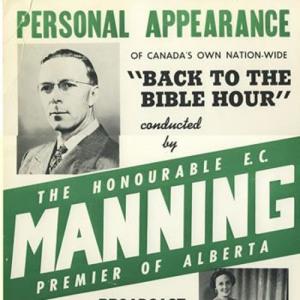
At my fortieth high school reunion a former classmate remembered me as a Bible-thumper. Frankly, I was shocked by this characterization. I can’t recall talking religion at Strathcona High School, and I suspect I rarely did. On the other hand, my speech was largely free of vulgarity or profanity, I didn’t date (or even talk to girls) and I was never invited to parties. In short, I was the son Muriel and Gordon raised me to be.
As I approach my 65th birthday I am just starting to grapple with the eternal how-did-I-get-this-way question. For better or worse (and there is plenty of both) I was raised by people who placed their Christian faith at the very center of life. It wasn’t just the most important thing; it was also the second and third most important thing.
My mother worked for the Baptist Union of Western Canada while they were headquartered in Edmonton, and when they decamped to Calgary, she hired on with the Canadian Bible Society.
My father worked as an electronic technician with the federal Department of Transport, but, especially in his later years, it was just a way to support the family. My father lived for church. At the breakfast table, dad once shared a dream. Crossing the street on his way to worship, he was hit by a bus. As he lay in the gutter, a broken bone protruding through his shredded dress pants, he weighed his options, “Should I got to the hospital or should I continue on to church?”
Dad looked confused and a little bit hurt when we all exploded in laughter. For him, this was a genuine dilemma.
My parents’ religious bent made Christmas an agony for my sister Carol and I when we were kids. We were allowed to open one present before breakfast after which we headed to church (we still worshipped on Christmas Day back then). While my friends talked about all the neat presents they had received I listened glumly. Then it was home for Christmas dinner followed by the reading of the entire Christmas story in Luke’s gospel. Then, and only then, did the serious present opening begin. My parents wanted us to know the reason for the season.
When the Bean family moved south to Edmonton in 1964, we bought our first television, but we couldn’t watch it on Sundays. This created a problem for Carol and me when the Beatles were scheduled to appear on the Ed Sullivan show. We told our parents that we couldn’t go to the evening church service because we had too much homework. Dad threatened to remove the picture tube, but he didn’t and we listened to the Fab Four (or four hundred girls screaming deliriously, you couldn’t really hear the music).
My mother grew up in Ontario, one of three children born raised by my grandmother, Ada Dodd. I don’t know my grandfather’s name because he died when my mother was three years old. Grandmother took in laundry to make ends meet, but they never did. My uncle Ross lived with a local farmer for several years because his mother could neither feed nor control him. When the depression hit, the Dodds moved to Calgary to be close to more fortunate members of their family.
My mother attended a special high school that trained young women to be stenographers—one of the jobs considered appropriate for women in those days.
My father grew up in Weyburn, Saskatchewan, a prairie town not far from the North Dakota border. His father migrated east from Ontario in 1914 and his Swedish mother came north from the Dakotas. The Canadian west was opened up by the railroad and was virtually empty at the advent of the twentieth century. Alberta, Saskatchewan and Manitoba were gradually settled by new arrivals from Ontario, the British Isles, the American Midwest and, a bit later, continental Europe. All three prairie provinces were settled by all four types, but Alberta got more than its share of Americans, Manitoba got the lion’s share of the Brits, and Saskatchewan was settled by disproportionate numbers of Scandinavians (normally via the United States), Ukrainians and other Europeans.
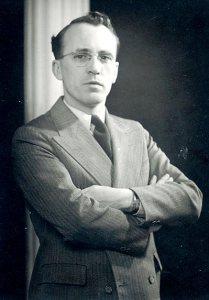
Tommy Douglas arrived in Weyburn, Saskatchewan in 1929 when my father was ten years old and served Calvary Baptist Church until 1934, when he made an unsuccessful run for provincial office. The Baptist Union told Douglas that he could be a pastor or a politician, but not both. He chose politics. Douglas ran a successful campaign in 1935 and represented Weyburn as an MLA (Member of Legislative Assembly) until 1942 when he became the leader of the provincial CCF (Cooperative Commonwealth Federation).
The CCF swept the Saskatchewan election of 1944, winning 40 of 52 seats. As party leader, my father’s pastor and Sunday school teacher became the leader of the first socialist government in North America.
Tommy Douglas preached the social gospel he had learned at Brandon College and the University of Chicago. Religion and politics, in his view, were different means to the same end. When my father died, I inherited a shelf of books by and about Tommy Douglas. Dad never cared for the social gospel, but I suspect he cast his share of votes for the New Democratic Party (the successor to the CCF). I’m guessing here because never told Carol and me who they voted for.
Dad died in 1994, six years before Douglas was voted the greatest Canadian of the 20th Century—largely for the pivotal role he played in bringing socialized medicine to Canada.
Dad’s disapproved of the social gospel because it pushed heaven and hell to the margins in the interest of more practical concerns like economic justice and universal access to medical care. Dad imbibed the old heaven-hell version of Christianity from the pastors and teachers he encountered before and after Douglas and his commitment to the old time gospel was reinforced when he settled in Calgary, Alberta after the Second World War.
You may be wondering why a piece on my parent’s religion spends so much time talking about politics and the oil business. For one thing, there has always been a co-dependent relationship between religion, big money and politics, and this is especially true in places like Texas and Alberta.
Political winds can be created artificially by financial largesse, or organically by an economic crisis like the Great Depression. The Social Credit Party swept to power in Alberta in 1935, short months after the party was created. Status quo politics had no answer for the great depression and voters on the Canadian prairies were willing to roll the dice.
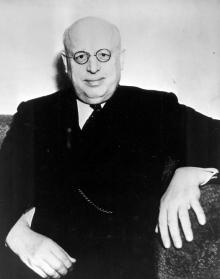
The Social Credit Party was headed by William “Bible Bill” Aberhart, a Calgary high school principal and radio preacher who learned his pre-millennial religion from correspondence courses sponsored by Cyrus Scofield. While still working full-time as a public school principal, Aberhart founded the Calgary Prophetic Bible Institute (CPBI) so he could promote the religious theories he had learned from Scofield.
Like all populist politicians, Aberhart needed a devil, and the eastern banking establishment and big money boys in Toronto fit the bill perfectly. Bible Bill promised to end the depression by distributing $25 (the equivalent of $400 in today’s money) to every family in Alberta on a monthly basis. He also wanted to nationalize the banking system, something the British North American Act (a kind of Canadian constitution) prohibited.
Aberhart died in 1943 and was succeeded by Ernest C. Manning. Manning was the first graduate of the Calgary Prophetic Bible Institute (his only formal education), so he shared his mentor’s fascination with the imminent end of the world. But the second leader of the Social Credit Party quickly distanced himself from radical, depression-era politics, and made friends with the oil industry and the chamber of commerce. The times they were a-changin’. A major oil discovery was made in Leduc, Alberta in 1947 and it was widely speculated that the massive Athabasca tar sands in northern Alberta would soon have the province swimming in money.
Ernest Manning inherited the Back to the Bible Hour radio program from Aberhart and used it to good effect. My father would turn in to CFRN every Sunday morning to listen to Manning decry religious and political liberalism just as dad had listened to Billy Graham on CFYK when we lived in the Northwest Territories. This was made sense because Graham and Manning were close friends.
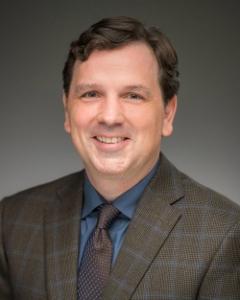
Darren Dochuk, now a history professor at Notre Dame, who grew up a couple of blocks from my parents’ home in Edmonton, calls religion and oil the twin pillars of American exceptionalism. He’s writing a book on the subject (you can find his lectures on the subject here.) According to Dochuk, Billy Graham sided with a group of fabulously wealthy Southwestern (mostly Texan) oil wildcatters who, following massive oil discoveries in east Texas, were at war with the major oil companies that had historically lived under the thumb of Rockefeller Money.
Until mid-century, the form of liberal civil religion popular in American mainline denominations was closely aligned with the Washington political establishment. The Rockefellers used their vast wealth to bankroll the University of Chicago, support the National Council of Churches, build Riverside Church in New York City for Harry Emerson Fosdick, and helping Union Theological Seminary attract the likes of the Niebuhr brothers and Paul Tillich.
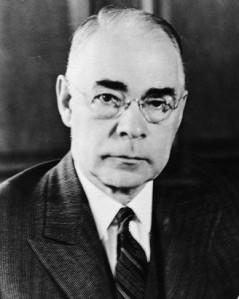
Men like J. Howard Pew of Sunoco Oil were determined to balance the power equation. To counter the influence of Rockefeller philanthropy, J. Howard Pew created the Pew Charitable Trust. He also made millions of dollars available for conservative religious and political organizations and Billy Graham, always eager to fund his sprawling evangelistic enterprise, wanted a piece of the action. This explains, incidentally, why Graham joined W.A. Criswell’s First Baptist Church in Dallas, the home of wealthy oilmen like H.L. Hunt (reputed by some to be the world’s richest man).
My father subscribed to Christianity Today, a Billy Graham-inspired and Pew-funded monthly that spouted the same blend of conservative politics and conservative religion Ernest Manning preached on the Back to the Bible Hour. No one could tell where Manning’s religion ended and his politics began—it was all of a piece.
In the mid-1950s, J. Howard Pew became fascinated by the Athabasca Tar Sands and started reaching out to Ernest Manning. Vast oil reserves were being discovered throughout the Arab world and Manning was touting Alberta as a credible alternative for American investors.
The Pew-Manning relationship got off to a rocky start. Manning knew that Albertans, though conservative, were just as suspicious of American business interests as they were of Eastern Canada. Unless Pew could prove that his investment in the tar sands would benefit all Albertans the deal wouldn’t fly. Pew was having none of it. It should be nobody’s business what he did with his own money.
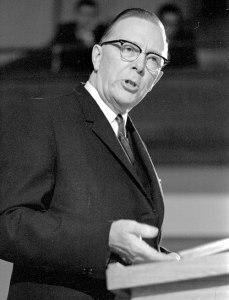
Billy Graham talked Pew and Manning into playing golf at a Jasper, Alberta resort and, in the course of the weekend (Pew shot a round of 83, his age at the time) brokered a compromise solution. By the mid-sixties, Pew was committed to investing a quarter billion dollars in the tar sands project. The Keystone XL Pipeline running from Northern Alberta to Houston and Port Arthur in Texas, is a natural development of this marriage between conservative religion and big oil.
These behind-the-scenes negotiations captured little notice at the time and I’m sure my father wasn’t paying attention. The background is important, however, because my father, like millions of other committed Christians, was being shaped by this curious blend of oil and religion.
My parents learned their religion in church and on the radio. Neither had the luxury of attending college and, like the vast majority of Christians, never studied theology. Their available religious options, therefore, were a product of the environment in which they were raised and that environment was largely shaped by preacher-politicians like Tommy Douglas and Ernest Manning. College courses, even those not explicitly religious, can force students to reckon with a wide range of religious options. Bible schools, like the one Bible Bill created in Calgary, communicate a single vision; that is their weakness and the source of their power.
Tommy Douglas earned a post-graduate degree in theology and a second in sociology; William Aberhart attended teacher prep schools and Manning had no formal education beyond Aberhart’s Prophetic Bible Institute. The social gospel was always an elite enterprise; end-times evangelicalism was for the masses.
That said, my parents were not enamored of fundamentalists. My mother had listened to T.T. Shields (the Canadian equivalent of J. Frank Norris) as a child in Toronto. Her beef with Shields, and the brand of fundamentalism he represented, was more practical than theological. The anti-liberal witch hunt inspired by men like Shields and Norris made it almost impossible for Baptists to work together.
As a child, I was never exposed to the internecine hostility my parents had witnessed (that would come later), but it affected me all the same. Although I was raised in a conservative religious environment, I don’t think I heard anyone preach hellfire and damnation. Texas Baptists may have a hard time imagining a Baptist church without revivals and altar calls, but that’s the kind of Baptist world I was raised in.
The Baptist environment I inherited was an unstable stalemate between the liberal and conservative wings of the Baptist Union of Western Canada. Preaching politics from the pulpit, whether liberal or conservative, was strictly verboten. The pulpit rhetoric I was exposed to as a child was responsible, temperate and generally dull. Liberal pastors attended McMaster Divinity School in Hamilton, many conservatives migrated to the dispensational Bible Schools that the Baptist Union did not recognize, and moderates looked for a safe alternative.
This may explain why my mother’s work at the Baptist Union headquarters was often so distressing to her. Mom considered the redoubtable Margaret Thompson to be the real brains of the operation but was underwhelmed by most of the men she worked with. They were a conflicted and compromised lot, investing most of their time (like all denomination officials) putting out fires.
My parents remained faithful members of McLaurin Memorial Baptist Church in Edmonton but, by the late 1960s, their hearts belonged to a blossoming charismatic movement. My father became active with the Full Gospel Businessmen’s’ Fellowship International (FGBMFI) while my mother became the Alberta president of Women Aglow (the FGBMFI’s women’s auxiliary).
It was quite a shock to see my staid Baptist parents speaking in tongues, praying for the sick and talking about meetings where the floor was covered with worshippers “slain in the Spirit”. My mother was convinced that God had healed her hypothyroidism and stopped taking her medicine, (I suspect she quietly resumed her daily dosage when her symptoms returned).
Now my father had a new beef with the fundamentalists: they were cessationists who believed the “signs and wonders” reported in the New Testament ended with the Apostolic Age. My father was particularly angered by W.A. Criswell’s book on the Holy Spirit. For a time, my mother traded in her murder mysteries and regency romances for little books on Holy Spirit Baptism, religious weight loss formulas and the charismatic revival.
I read some of these books. I attended the meetings. I just didn’t get it. Ernest Manning’s Back to the Bible Hour had just sounded hokey and outdated; this new stuff seemed downright weird. My mother accused me of overthinking things. “I used to have that problem,” she would say when I admitted a failing or frustration, “before I got the baptism.”
I never got the baptism. I prayed for it, dutifully, but zero fervor. I didn’t really want to speak in tongues and was skeptical about the faith healing thing. But the charismatic stuff gave Gordon and Muriel Bean something they weren’t getting from Baptist life.
The appeal was partly empirical. The end-times formulas attracted men like Aberhart and Manning because they made Christianity sound reasonable, even scientific. The charismatic movement, oddly enough, was valued by many for similar reasons—it removed religion from the world of conjecture by providing objective, empirical evidence that God was real and at work. You didn’t get that from McLaurin Baptist Church.
But my parents had good reasons for keeping one foot in McLaurin. “There’s a stability here I don’t find with the Pentecostals,” my father once admitted to me. I knew what he meant. My parents’ new friends were waiting to be raptured up to heaven, they were fixated on the fate of Israel and were asking if Henry Kissinger might be the Antichrist. When my parents traveled to the charismatic mecca of Southern California they couldn’t understand why everyone was so enamored of a creep like Pat Robertson. “I’m not sure about his religion,” dad told me in the mid-eighties, “but his politics are just mean.”
My father may have disliked the social gospel preaching, but he loved social gospel politics. A true child of the depression, he was always on the side of the outcast and the little guy. So was my mother.
How did all of this affect me? That’s for next time.
